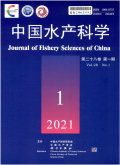中国水产科学2024,Vol.31Issue(5):576-587,12.DOI:10.12264/JFSC2024-0033
水中添加柠檬酸对大口黑鲈耐低氧能力的影响
Effects of citric acid addition to water on the hypoxia tolerance of largemouth bass(Micropterus salmoides)
摘要
Abstract
During the fishing and transportation processes of farmed fish,they are stimulated by various stressors,such as high density,hypoxia,vibration,and sound,which can damage the fish body or cause rapid death.Carboxylic acid(CA)is an important edible organic acid that is easily soluble in water,inexpensive,and readily available.CA is often added as a feed additive in formula feed to improve the growth performance of farmed fish,maintain intestinal health,and enhance immune and stress resistance.However,there have been few reports on the use of CA in water to enhance the ability of fish to resist acute stress.Largemouth bass(Micropterus salmoides)is a widely cultivated and economically important fish in China;however,it is not tolerant of low oxygen levels.Largemouth bass will surface and die when dissolved oxygen(DO)is below 2 mg/L.Deaths caused by acute hypoxic stress during fishing and transportation have attracted considerable attention.To investigate the effects of CA added to water on the hypoxia tolerance of largemouth bass under acute hypoxia stress,using juvenile largemouth bass[mean weight:(18.53±0.43)g]as the study subject,CA was added to the culture water to a final concentration of 0(T0),0.01‰(T1),0.05‰(T2),and 0.10‰(T3),respectively,and oxygenation was stopped in the water with an initial dissolved oxygen concentration of 7.5 mg/L.Acute hypoxic stress was applied for 2.5 h,and the DO in the water was measured every 0.5 h.The DO concentration in the control group was(7.5±0.2)mg/L.At the end of the stress period,stress tolerance,body damage,and mortality were assessed.The results showed that,compared with the T0 group,the oxygen consumption of the T2 group during the first 2.5 h of acute hypoxic stress significantly decreased.The T3 group had significantly reduced oxygen consumption and mortality rates of largemouth bass under acute hypoxic stress(P<0.05).Compared with the control group,the stress-related indicators of cortisol(COR),lactate(LD),and glucose(GLU)in the plasma of largemouth bass in the T0 group were significantly increased,and the levels of malondialdehyde(MDA)and hydrogen peroxide(H2O2),which characterize oxidative damage in the body,were significantly increased.The activities of glutamic oxaloacetic transaminase(GOT)and glutamic-pyruvic transaminase(GPT),which characterize liver damage,were significantly increased(P<0.05).Compared with the T0 group,there were no significant differences in various indicators in the plasma of the T1 group of largemouth bass(P>0.05).The hemoglobin(Hb)content in the blood of the T2 group significantly increased,while the LD content and GOT and GPT activities in the plasma significantly decreased(P<0.05).The number of red blood cells(RBC)and Hb content in the blood of the T3 group significantly increased,while the levels of COR,LD,and H2O2 in plasma significantly reduced,and the activities of GOT and GPT significantly decreased(P<0.05).Compared to the control group,the transcription levels of the cysteine proteolytic enzyme 3(caspase-3)and cysteine proteolytic enzyme 8(caspase-8)genes related to liver apoptosis in the T0 group of largemouth bass were significantly higher(P<0.05).Compared with the T0 group,the transcription level of the caspase-3 gene in the liver of the T1 group significantly decreased(P<0.05).The transcription level of the glucose transporter-1(glut-1)gene in the liver of the T2 group of largemouth bass significantly increased,while the transcription level of the caspase-3 gene significantly decreased(P<0.05).The transcription level of hypoxia-inducible factor 1(hif-1α)and glut-1 gene in the liver of the T3 group significantly increased,while the transcription level of the caspase-3 gene was significantly reduced(P<0.05).In summary,acute hypoxic stress caused oxidative stress,body damage,and even mass mortality in largemouth bass;0.10‰ CA could improve the ability of largemouth bass to resist acute hypoxic stress,alleviate the damage caused by acute hypoxic stress on the body,and reduce mortality.This study provides the data and a reference for solving the problem of acute hypoxic stress in fish during fishing and transportation.关键词
柠檬酸/缓解/大口黑鲈/急性低氧胁迫/机体损伤/死亡率Key words
citric acid/mitigation/Micropterus salmoides/acute hypoxic stress/body injury/mortality分类
农业科技引用本文复制引用
刘佳林,于浩东,陈菲菲,张学振..水中添加柠檬酸对大口黑鲈耐低氧能力的影响[J].中国水产科学,2024,31(5):576-587,12.基金项目
国家重点研发计划项目(2019YFD0900303) (2019YFD0900303)
中央级高校基本科研业务费专项资金项目(2662019FW013). (2662019FW013)

